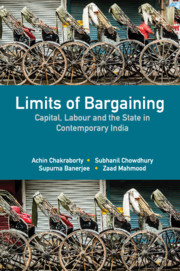Book contents
- Frontmatter
- Contents
- List of Tables
- List of Figures
- Preface
- 1 Contextualising Trade Unions and Collective Bargaining
- 2 Collective Bargaining in India: An Overview
- 3 Everyday Processes of Collective Bargaining in West Bengal
- 4 Industrial Stagnation due to ‘Labour Militancy’? A Critical Look at the Macro Evidence
- 5 Trade Unions and Working-Class Politics in Contemporary West Bengal
- 6 The State and Collective Bargaining
- 7 Conclusion
- References
- Index
Preface
Published online by Cambridge University Press: 05 June 2019
- Frontmatter
- Contents
- List of Tables
- List of Figures
- Preface
- 1 Contextualising Trade Unions and Collective Bargaining
- 2 Collective Bargaining in India: An Overview
- 3 Everyday Processes of Collective Bargaining in West Bengal
- 4 Industrial Stagnation due to ‘Labour Militancy’? A Critical Look at the Macro Evidence
- 5 Trade Unions and Working-Class Politics in Contemporary West Bengal
- 6 The State and Collective Bargaining
- 7 Conclusion
- References
- Index
Summary
The large-scale violence at the Manesar plant of Maruti Suzuki and at Honda Motorcycle and Scooter India a few years ago, and similar incidents reported elsewhere, are indicative of the fact that the role of labour institutions in India in resolving conflicts between the workers and the management and facilitating collective bargaining to reach an amicable settlement needs closer scrutiny. We are of the view that, while thinking about labour market reforms, the growing sense of injustice and discontentment among the industrial labour force needs to be faced with greater sensitivity and caution than what is prevalent in the overall climate of apathy towards the problems of the so-called privileged organised labour.
Given the fact that the vast majority of the working people in India is outside the net of any social protection and workers’ rights, it is not difficult to understand the general apathy in the society towards the concerns of the organised workers. The literature on organised trade unions is often mired in the rhetoric of indignation of two extreme kinds—either at the plight of the workers who are losing their hard-earned rights or at the presumed privileges enjoyed by the so-called labour aristocracy. Going beyond the rhetoric, this book takes a hard-headed look at the collective bargaining institutions and the processes in the Indian state of West Bengal (WB) with an analytical approach that combines the macro aspects of the economy of a region with the micro observations on the processes from the field. Our humble claim is that even though the empirical material for the book is primarily drawn from the state of WB, we have tried to present enough analytical observations using secondary material so that the book would be found useful by anyone interested in issues of labour market, trade union organisations, collective bargaining institutions and the role of the state.
The book is the outcome of a collaborative research effort of a truly interdisciplinary kind. While Achin and Subhanil are formally trained in economics, Supurna and Zaad are trained in political science/sociology.
- Type
- Chapter
- Information
- Limits of BargainingCapital, Labour and the State in Contemporary India, pp. xi - xiiPublisher: Cambridge University PressPrint publication year: 2019

